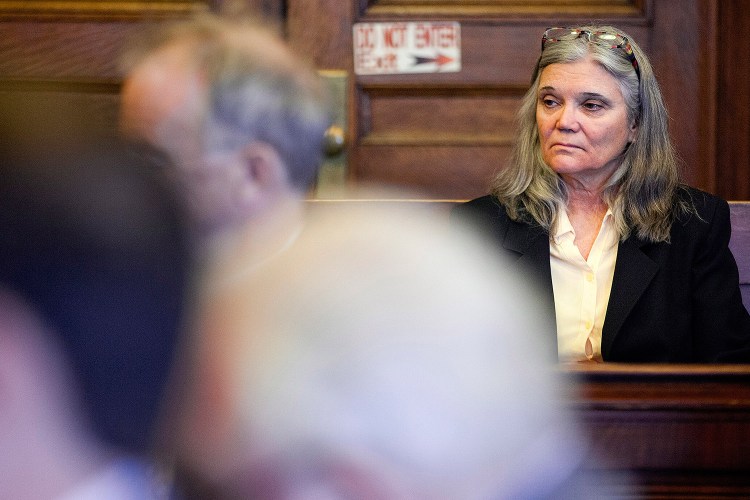The wife of 72-year-old Merrill “Mike” Kimball broke into tears under intense questioning by a prosecutor Monday as the final witness at her husband’s murder trial.
In her testimony, Karen Thurlow-Kimball had described how every member of her family was violently attacked on Oct. 6, 2013, before her husband fatally shot his attacker, 63-year-old Leon Kelley, at a North Yarmouth bee farm.
Thurlow-Kimball, a slight woman who spoke in a quiet voice, described how Kelley’s 205-pound stepson, Craig Rawnsley, first yelled at her and shoved her up against her pickup truck with enough force to injure her shoulder and ribs. Rawnsley then shoved her son, Damon Carroll, when he stepped to his mother’s defense, she told the jury.
And Thurlow-Kimball said Kelley, who weighed 285 pounds, began shoving her husband without provocation as soon as the men introduced themselves, neither having met before that day.
“Leon started right off pushing my husband, and he kept pushing him backward harder and harder,” Thurlow-Kimball said. “My husband was backing up farther and farther trying to get away from Leon.”
QUESTION: DID SHOOTER OVERREACT?
Then under cross-examination by Assistant Attorney General Matthew Crockett, she began wiping tears from her eyes, something no other witness has done during the six days of the trial in the Cumberland County Courthouse in Portland.
Crockett made her look again at a poster-size photo taken moments after the shooting. The photo showed her husband with a pistol held extended in his right hand, Kelley sprawled on the gravel driveway before him clutching his wounded torso, and Thurlow-Kimball on her phone in the background calling 911.
Crockett pointed to several more feet of gravel and grass beyond the roughly 35 feet that Kimball had already retreated and asked Thurlow-Kimball repeatedly why her husband drew his gun and shot instead of retreating farther.
“I don’t know how much he could have backed up or not backed up. What I know is that in his physical condition, he has a hard time moving,” Thurlow-Kimball said after pausing to wipe tears from her eyes, take a drink of water and regain her composure.
Kimball, who is licensed to carry a concealed handgun, maintains he acted in self-defense when he drew his Ruger .380 and fired three shots into Kelley’s torso as the larger man continued to come at him. Kelley, who was 6-feet-4-inches tall, stood 5 inches taller than Kimball and outweighed him by 115 pounds.
Crockett said at the start of the trial that the evidence would show that Kimball “overreacted” by shooting and could have continued to flee from Kelley down Honeycomb Drive at Brown’s Bee Farm, where his wife had worked since 2009.
Kimball’s attorney, Daniel Lilley, and another prosecutor, Assistant Attorney General John Alsop, are expected to make closing arguments Tuesday morning. Justice Roland Cole said he will then explain the state’s self-defense laws to the jury, as well as the possible charges of murder or manslaughter for them to consider during their deliberations to follow.
BUSINESS DISPUTE BOILS OVER
The shooting at the bee farm off Greely Road followed an ongoing, bitter rift between the families over a business built up by 95-year-old Stan Brown, a master beekeeper well-known in the state’s small beekeeping community.
Thurlow-Kimball had started working for Brown at the farm in 2009, and developed a close friendship with the older man over a common bond of a hobby they shared. She testified that Brown’s family rarely took an interest in him until just weeks before the shooting, and that she had run Brown’s business for him as dementia set in and cared for him in his family’s absence.
That relationship changed after Brown made Thurlow-Kimball a beneficiary in his will, leaving her the bee business. Brown’s daughters – including Kelley’s wife – and other members of the family were concerned that Thurlow-Kimball was taking advantage of their father as his memory began to fade.
Thurlow-Kimball testified that after she spent part of the morning at the bee farm sales shop with Brown beside her, she finalized her honey processing work for the season and returned home to Yarmouth. Thurlow-Kimball said she then received a threatening phone call from Rawnsley, who told her things at the farm “were going to change.”
She testified that after hanging up on Rawnsley, she called Brown’s daughter-in-law, Libby Adams, who acted as the bookkeeper for the bee business, and learned that the Kelley family planned to change the locks on the bee farm sales shop, which had between $4,000 and $7,000 worth of Thurlow-Kimball’s honey inside.
“She said get your honey out of there,” Thurlow-Kimball said of Adams, who sided with her in the family feud.
Thurlow-Kimball said she knew the situation could be tense, but she never expected violence.
DEFENDANT CHOOSES NOT TO TESTIFY
Her son, Carroll, also testified in Merrill Kimball’s defense that Rawnsley attacked him and his mother, and that Kelley attacked Kimball before Kimball fired.
Rawnsley testified last week that he never assaulted Thurlow-Kimball and only put his hand on Carroll’s shoulder to hold him back.
Kimball did not testify at the trial, but jurors were able to hear his version of what happened several times in a police video and reading of grand jury testimony he gave a month after the shooting.
Kimball was never arrested in the case and remains free on bail after being indicted on the murder charge in November 2013.
He faces 25 years to life in prison if convicted of murder. If convicted of manslaughter, he faces up to 30 years in prison. Kimball rejected a plea offer before the start of the trial. The terms of the offer have not been disclosed.
Send questions/comments to the editors.



